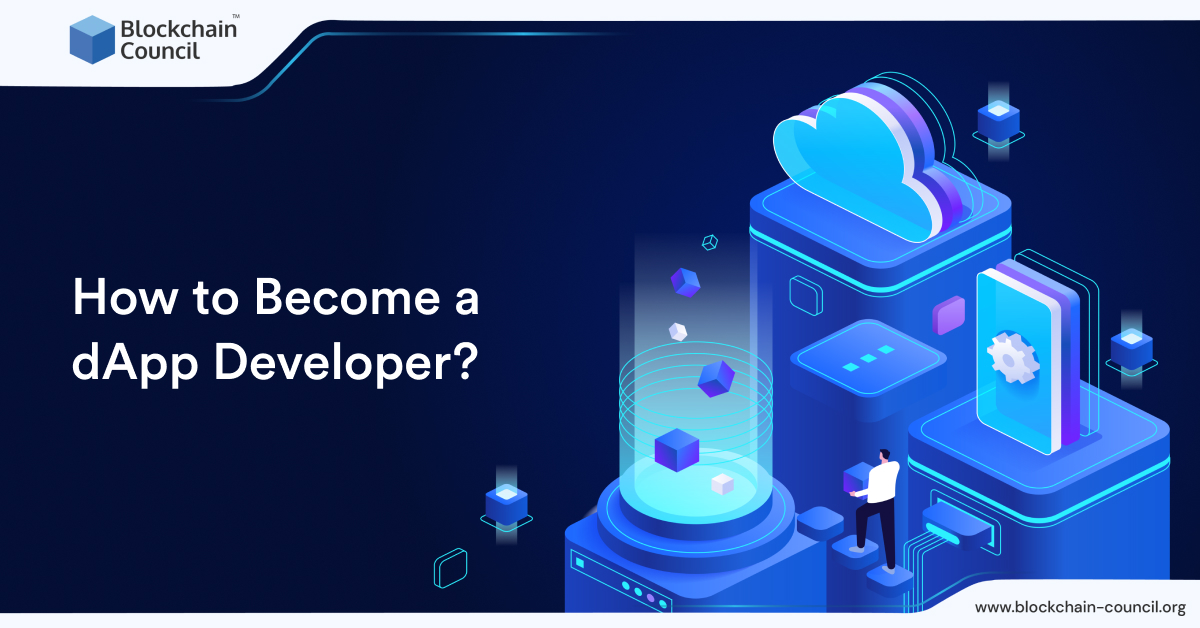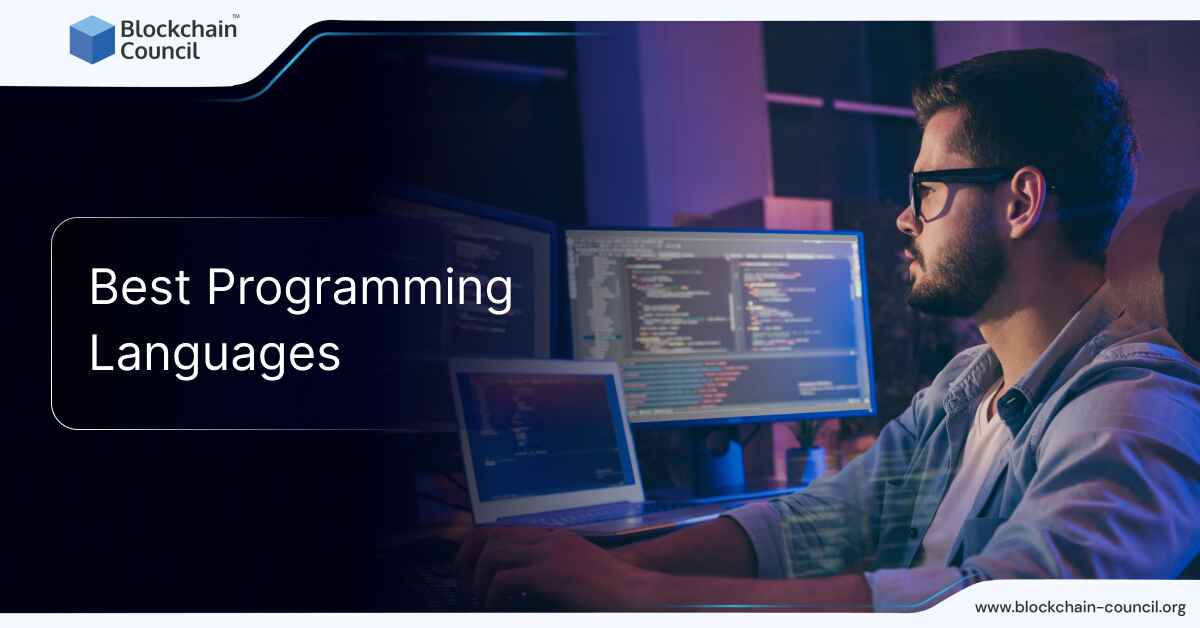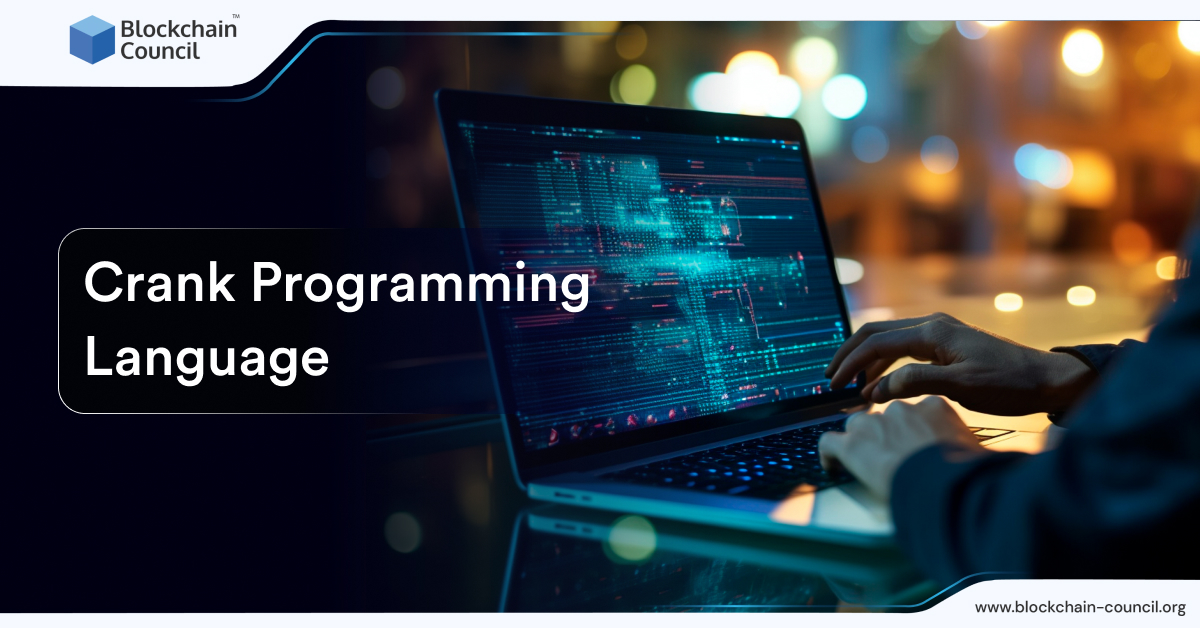
- Blockchain Council
- September 17, 2024
Summary
- A dApp is a software application operating on a decentralized network like a Blockchain.
- These applications are designed to be trustless, transparent, and secure, as they do not rely on a central authority for their operation.
- These apps use distributed ledgers and offer immutability in data storage and management.
- Programming languages, understanding of Framework & Protocols, technical skills & technologies are essential for dApp developers.
- A protocol is a standard set of rules that define how a decentralized network operates.
- Without a protocol, a dApp could not communicate with the network or execute transactions.
- A framework is a pre-written code that provides a set of tools and features for developers,
- Frameworks make it easier for developers to write code and build dApps without worrying about the underlying infrastructure.
- React Native uses off-chain solutions, such as IPFS and Swarm, to store data and reduce the load on the Blockchain network.
- Online Certifications validate your skills, knowledge, and experience, making it easier for you to land better job opportunities and build your career in Blockchain technology.
Decentralized applications (dApps) have gained significant traction recently due to their new-age safety features and benefits. A dApp is a software application that operates on a decentralized network, such as a Blockchain, and utilizes smart contracts to execute transactions. These applications are designed to be trustless, transparent, and secure, as they do not rely on a central authority for their operation. The importance of dApps lies in their ability to offer a new level of transparency, security, and privacy in various industries.
These decentralized applications are built on Blockchain to use distributed ledgers and offer immutability in data storage and management for these applications. With the increasing demand for decentralized application solutions, the need for dApp developers has grown exponentially in the mobile and web application development industry. In this guide, we will give you a strategic roadmap to learn dApp development and explore the steps necessary to become a dApp developer and build a career by utilizing opportunities available in this emerging field.
Let’s get the ball rolling!
Skills Required for dApp Development
For credible dApp development learning, you need to be proficient in a collective skillset of numerous programming languages, including Python, Java, and various others. It also includes a thorough understanding of crucial technical pillars of application development like Framework and Protocols. Given below is a detailed individual description of key technical skills and technologies to help you learn dApp development by efficiently strategizing your upskilling as a dApp developer:
Popular Programming Languages
In dApp development, programming languages are critical in building smart contracts and web3 applications. Solidity, JavaScript, and Python are some of the most popular programming languages used in dApp development. Solidity is a high-level language used to write smart contracts and build applications on the Ethereum Blockchain. It is similar to JavaScript in syntax and is used for developing complex decentralized applications. Solidity offers various features like inheritance, interfaces, and libraries, doing the writing, deploying, and testing of smart contracts easily.
Second in the series is JavaScript, a popular programming language used in front-end web development. It is used to build decentralized applications that run on web3. JavaScript is also used with other frameworks like React and Angular for the front-end development of decentralized applications.
Python is the third most popular language, a general-purpose programming language used for various applications, including dApp development. It is used in the back-end development of decentralized applications, especially for developing scripts to interact with smart contracts.
Blockchain Technology
Blockchain is a new-age decentralized, digital, distributed ledger technology that allows the platform to facilitate secure and transparent transactions without intermediaries. It is the foundational technology of dApp development, as it enables the creation of decentralized applications. Blockchain technology offers transparency and immutability and eliminates centralization, making it an ideal platform for dApp development. The most popular Blockchain platforms for developing decentralized applications are Ethereum, EOS, and TRON.
The leader among numerous Blockchains in the industry is Ethereum, a Blockchain platform that enables the creation of decentralized applications through smart contracts. It is the most popular Blockchain platform for dApp development due to its robustness, flexibility, and widespread adoption.
In the second place, EOS is another Blockchain platform for developing decentralized applications. It offers high throughput, low latency, and low transaction fees, making it most suitable for developing decentralized applications that require high-speed transactions.
Last but not least, TRON is among the most popular and globally used Blockchain platforms enabling decentralized applications for the entertainment industry. It offers low transaction fees, high throughput, and seamless integration with other Blockchain platforms.
Decentralized Protocols
Decentralized protocols can be explained as specific sets of rules to govern the behavior of decentralized applications. They are used to ensure that these Blockchain-based dApps are secure, transparent, and autonomous. The most popular decentralized protocols among Web3 and decentralized application developers include InterPlanetary File System (IPFS), Whisper, and Web3. These protocols enable decentralized storage, messaging, and communication between decentralized applications.
The leader in decentralized protocols, IPFS is a decentralized protocol that enables the storage and distribution of files in a distributed network. It offers features like versioning, content-based addressing, and deduplication, making it most suitable for sharing and storing large data packets in a decentralized manner. Another popular decentralized protocol is Whisper. It offers message filtering, end-to-end encryption, and topic-based subscriptions, making it ideal for developing decentralized messaging applications. Coming to Web3 is also a globally popular decentralized protocol that enables the communication between dApps and the Blockchain. It offers features like active account management, smart contract interactions, and transaction monitoring, making it ideal for dApp development.
Smart Contracts
You can understand these as self-executing commands written in a contract without physical presence. These commands are directly fed to the development code that automates contractual agreements among transaction parties. Smart Contracts are the fundamental building blocks of decentralized applications written in programming languages like Solidity.
They allow the creation of decentralized applications that perform various functions like storing data, storing data, and executing business logic. Their Blockchain-based execution ensures their tamper-proof, transparent, and autonomous nature. Smart contracts are used in various applications like NFTs (non-fungible tokens), DeFi (decentralized finance), and supply chain management. Their key benefits include enhanced security, reduced transaction costs, and transparency, among others on the list.
Distributed Data Management
Distributed Data Management is a critical aspect of dApp development, as it enables the storage and management of data in a decentralized manner. In dApp development, distributed data management is achieved through decentralized databases like Ethereum Swarm, IPFS, and BigchainDB.
Relevance of Framework and Protocols in dApp development
Protocols and frameworks are crucial for dApp development. A protocol is a set of rules and standards that define how a decentralized network operates. It provides the foundation for dApp to interact with the Blockchain network and ensures that the transactions are secure and transparent. Without a protocol, a dApp could not communicate with the network or execute transactions. On the other hand, frameworks provide developers with tools and libraries to build and deploy dApps quickly and efficiently. A framework is a pre-written code that offers developers a set of tools and features to work with, allowing them to focus on the application’s functionality rather than the underlying infrastructure. Frameworks make it easier for developers to write code and build dApps without worrying about the Blockchain network’s lower-level details.
Some Web3 development companies build need-specific frameworks allowing developers to deploy Web3 mobile applications using Web2 protocols. One such framework is React Native, a popular mobile application development framework that enables developers to build cross-platform apps using a single codebase. React Native can be used with several Web3 development frameworks, such as Truffle and Embark, to create dApps that can be deployed on mobile devices.
To enable the deployment of Web3 mobile applications, these frameworks use several Web2 protocols, such as HTTP and WebSocket, to communicate with the Blockchain network. For example, Embark uses the WebSocket protocol to connect to a local or remote Ethereum node, while Truffle provides an HTTP API for developers to interact with the network. One of the challenges of deploying Web3 mobile applications is mobile devices’ limited computing power and storage capacity. To address this, some frameworks, such as React Native, use off-chain solutions, such as IPFS and Swarm, to store data and reduce the load on the Blockchain network.
Become a Blockchain Expert Today!
How to Get Started With dApp Development?
Are you interested in dApp development but need help figuring out where to begin? Don’t worry; we’ve got you covered! Here is a detailed step-by-step guide to help you start your journey toward becoming a successful dApp developer.
Step 1: Choose the Right Blockchain Platform
The first step in dApp development is to choose the right Blockchain platform. Ethereum is one of the most popular Blockchain platforms for dApp development, but other options exist, such as EOS, TRON, and Hyperledger Fabric. Consider each platform’s features, functionalities, and community support before choosing. Also, explore the tools and resources available for developers on each platform.
Step 2: Set Up Your Development Environment
Once you have chosen your Blockchain platform, it’s time to set up your development environment. This involves installing the necessary software and tools on your computer, such as a code editor, a Blockchain client, and a test network. For Ethereum development, you can use tools such as Ganache, Remix, and Truffle. These tools allow you to write, deploy, and test your dApp on a local Blockchain network.
Step 3: Learn the Basics of dApp Development
Before diving into complex projects, learning the basics of dApp development is important. This includes understanding decentralized protocols, smart contracts, and Blockchain technology. You can start by learning the Solidity programming language used to write smart contracts for Ethereum. You can also explore Blockchain technologies like IPFS, Swarm, and Whisper.
Step 4: Start with Simple Projects
Once you understand the basics well, it’s time to start building your first dApp! Begin with simple projects that involve basic functionalities such as user authentication, data storage, and transaction execution. This will help you gain experience and confidence in building dApps. You can also explore existing dApps and open-source projects to learn from other developers and develop problem-solving approaches for your projects.
Step 5: Test and Deploy Your dApp
After you have built your dApp, it’s time to test and deploy it on the Blockchain network. This involves thorough testing to ensure the dApp functions correctly and securely. You can also use test networks to simulate real-world scenarios and test the scalability and performance of your dApp. Once you are confident in your dApp, you can deploy it on an application store and make it available to users. As users try and use your built application, you will get more data for research and analysis purposes.
Need of Online Certifications to Gain Credibility
A certification from globally recognized companies like Blockchain Council can significantly enhance your skills and credibility as a dApp developer. These certifications prove your proficiency and expertise in the field to industry leaders worldwide who can also be your potential employers. They validate your skills, knowledge, and experience, making it easier for you to land better job opportunities and build your career in Blockchain technology.
Moreover, earning a certification from Blockchain Council can help you gain insights into the latest developments, best practices, and emerging trends in dApp development. This will equip you with the necessary skills and knowledge to create cutting-edge applications that meet the needs of modern businesses.
Some of the popular dApp development certifications offered by Blockchain Council include:
- Certified Blockchain Developer (CBD)
- Certified Ethereum Developer (CED)
- Certified Hyperledger Developer
- Certified Corda Developer (CCD)
- Certified Quorum Developer (CQD)
- Certified Solidity Developer (CSD)
These certifications cover many topics, including Blockchain basics, smart contract development, decentralized application development, and Blockchain security. By earning one or more of these certifications, you can enhance your credibility and position yourself as a skilled and knowledgeable dApp developer in the competitive Blockchain industry.
How to get employed as a dApp Developer?
In the emerging market and growing demand for dApp developers, there are several ways to land a job in this exciting and evolving field. Here are some strategies that you can use to get employed as a dApp developer:
- Full-time Job Opportunities for Experienced dApp Developers
One of the most traditional ways of getting employed as a dApp developer is to look for full-time job opportunities. Many Blockchain, Web3, and IT development companies seek skilled developers who can build innovative dApps. Look for job openings on job boards like LinkedIn/Indeed/Glassdoor or company websites. A strong portfolio of projects and experience working with popular Blockchain platforms and languages such as Ethereum and Solidity can increase your chances of getting hired.
- Freelancing or Starting a Development Company
Another option for dApp developers is to work as freelancers. This allows you to work on various projects and collaborate with clients from different industries. Platforms such as Upwork, Freelancer, and Toptal can connect you with clients seeking Blockchain and dApp development services. Starting your development company can also be a great way to showcase your skills and build your reputation in the industry.
- Contributing to Open-Source dApps
Contributing to open-source dApps is a great way to build your skills, gain experience, and network with other developers & leaders in the industry. You can contribute to popular open-source dApps like Gnosis, Augur, and 0x or create your open-source project. By collaborating with other developers and contributing to the community, you can demonstrate your technical expertise and build your reputation as a dApp developer.
- Hackathons and Developer Competitions
Hackathons and developer competitions are another great way to showcase your skills and gain recognition in the industry. These events allow you to work on real-world projects and collaborate with other developers, entrepreneurs, and industry experts. You can participate in hackathons hosted by companies such as ConsenSys and Ethereum or attend Blockchain conferences and events where hackathons are organized. Winning a hackathon or developer competition can be an excellent way to get noticed by potential employers and clients.
Conclusion
Decentralized Applications are becoming increasingly important in the Blockchain industry, with a growing demand for skilled dApp developers. Aspiring developers can utilize the resources available, including online courses, developer communities, and certifications from globally recognized companies like Blockchain Council. While becoming a dApp developer may seem daunting, the rewards are significant in job opportunities and the opportunity to work on cutting-edge technology that can transform industries. With dedication and hard work, anyone can pursue a career in dApp development and contribute to advancing this exciting field.
FREQUENTLY ASKED QUESTIONS
Yes, dApp developers can make money by building decentralized applications for clients, creating their dApps, and generating revenue through token sales or transaction fees. Additionally, skilled dApp developers are in high demand and can command high salaries in the job market.
The most commonly used programming languages for dApp development are Solidity, used for Ethereum-based applications, and JavaScript, used for developing dApps on other Blockchain platforms such as EOS, TRON, and NEO.
The cost of starting a dApp can vary widely depending on various factors, such as the complexity of the application, the features and functionality required, and the development team’s experience and location. Generally, it can cost anywhere from a few thousand to several hundred thousand dollars to build and launch a dApp. It is essential to have a well-defined business plan, a clear understanding of the target market, and a solid development team to ensure the success of dApp.





































































 Guides
Guides News
News Blockchain
Blockchain Cryptocurrency
& Digital Assets
Cryptocurrency
& Digital Assets Web3
Web3 Metaverse & NFTs
Metaverse & NFTs
